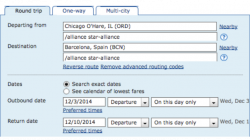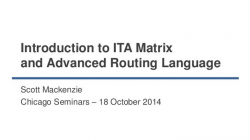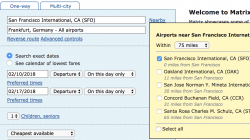Planning a trip can be very time intensive if you want a good experience. Should you invest that effort? For me, the answer is usually “yes.” I got into this hobby partly because I like travel but also because I like planning and organizing things. I even looked forward to helping Megan plan our wedding — until I learned just how complicated weddings can be.
But many people don’t like the seemingly infinite number of choices required. I can understand that, as well. The Cheesecake Factory has a menu that reads like a book, and I don’t think that’s to their advantage. The last time I was there I spent 20 minutes trying to figure out what I wanted to eat. At a nice restaurant I’ll pay twice as much so you’d think there would be pressure to choose well, but it’s a lot easier to pick a few options off a single page.
When you’re booking travel, that “menu” has millions of combinations. Even a simple itinerary from Seattle to San Francisco on a specific date has dozens of non-stop flights.
The Good and Bad with ITA Matrix
ITA is a great tool for searching flights. I like it for two reasons. The first is obvious to other fans: It offers a huge number of ways to customize your search and drill down into the specifics of your chosen itinerary. The second one is not so obvious because it’s the same thing that frustrates beginning users: You can’t book a flight on ITA.
Why is that good? It means that ITA has no vested interest in which flight you choose. All it does is grab the data you requested and display it. Sometimes it has bad data. Sometimes the site is glitchy and doesn’t work right. But it isn’t going to show you something wrong on purpose. As I said during my talk at the Chicago Seminars, ITA doesn’t do magic. It tells you what is, and it’s usually right, and then you can go find that same fare somewhere else and book it.
Knowing what the fare should be makes it much easier to know that you’re getting a good deal. Otherwise you’re guessing. There’s nothing wrong with that, either. If you find a fare you like, you should book it. Be happy. But I am happy when I know I got the best deal. And for that I am willing to spend a few minutes to an hour searching options on ITA
You Can’t Trust the Internet
Other search tools are not so honest. An article in yesterday’s Wall Street Journal explained “why you can’t trust you’re getting the best deal online,” because various online travel agencies (OTAs) have been using tricks to adjust their prices.
CheapTickets and Orbitz were checking whether you’re logged into an airline’s website, which may be an indication you’re comparing prices. If not, then they sometime displayed higher prices in their results.
Travelocity was found to be discounting prices for customers using iOS (which is ironic because a few years ago Orbitz was overcharging customers using Macs).
Hotels.com and Expedia were found to be offering some people higher prices at random.
I have conflicted feelings about this. I do believe that a merchant is allowed to offer whatever price it thinks a customer will pay, and that customer is free to accept that offer or leave. As long as the merchant hasn’t been dishonest (e.g., advertising claims that everyone gets the lowest price) or behaves with unlawful discrimination (race, gender, faith, etc.) then it’s like any other bargain. What makes the Internet unusual is that we’re used to walking into a store and seeing a listed price for everyone. Online, the merchant can give each customer their own virtual store. And it seems unfair if you’re not the one getting the better deal.
I find these business practices fascinating and expect that they will become the new normal.
If it’s possible to know whether your customer is comparing prices, wouldn’t you want to offer the best price to that person and make up the difference on all the suckers who don’t? If people who own Macs have more money, on average, then maybe they won’t mind paying more? But if they’re using an iPhone, maybe you give them a discount while you try to promote your new mobile site, since everyone says that the mobile web is the next big thing in travel.
As for random price increases? I’ll admit I don’t know the reason why, but you don’t need a reason. The above strategies worked off hypotheses that may or may not be true. Random price increases, combined with enough data collection, will enable any company to do a retrospective analysis. They can later sift through the digital fingerprints customers leave behind to see which demographics paid up and which passed. The results from that study will be used to target price increases in a more effective, non-random way in the future but without scaring away the most sensitive customers.
A company called Hotelied is already using the concept of targeted pricing as the core of its business model. Like a marriage between Hotwire and Klout, it claims to offer discounts to those with high standing in social media — even varying the discount based on your personal influence. Is this wrong? Not necessarily, if those are the customers a hotel values most. But the reason for valuing those customers is precisely the issue, as the discount may create guilt that then leaves the guest feeling more generous in providing a good review.
The Future of Unbiased Search
In a nutshell, I don’t think there is much hope for services like ITA Matrix. The increasingly glitchy website shows signs that Google is deprecating this service as it incorporates more and more of its features into Google Flights. Unfortunately, Google has the money to spend on companies like ITA but also has a tendency to lose interest in them quickly. It may eventually pull the plug.
The good news is that Google Flights is constantly getting better. Will it ever be as good as ITA Matrix? Maybe. I definitely don’t think it will look the same. Google will probably add some new features of its own and drop others.
The bad news is that Google Flights sells tickets. It has a vested interest in showing you certain options and adjusting prices as it thinks necessary to turn a profit. Maybe different OTAs and airlines will adjust their commissions or promise to spend more on AdWords campaigns.
If you want truly honest results, I think the future may be reverting to fare construction by hand, using a service like ExpertFlyer to look up available fares, read the rules, and then find availability on individual flights that meet those rules. Until the airlines figure out how to customize pricing for every customer — and I’m sure they’ll try — we can at least rely on our own homework with paper and pencil.





